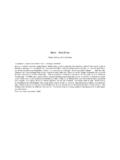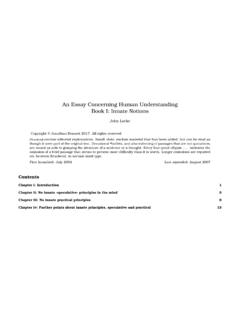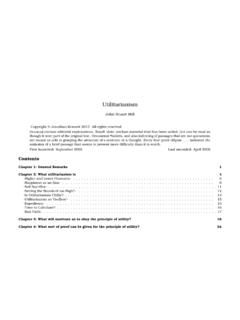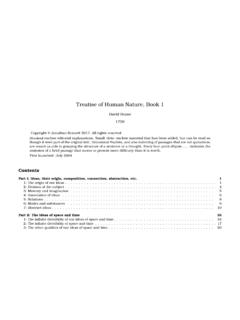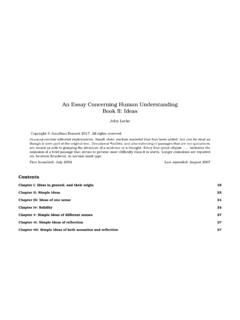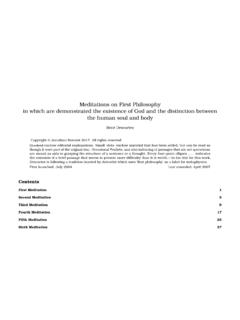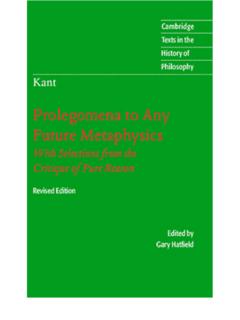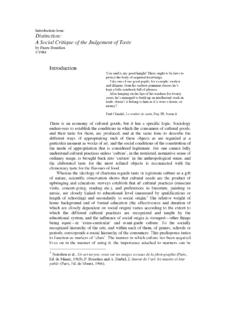Transcription of Groundwork for the Metaphysic of Morals - Early Modern Texts
1 Groundwork for the Metaphysic of MoralsImmanuel KantCopyright Jonathan Bennett 2017. All rights reserved[Brackets]enclose editorial explanations. Small dots enclose material that has been added, but can be read asthough it were part of the original text. Occasional bullets, and also indenting of passages that are not quotations,are meant as aids to grasping the structure of a sentence or a thought. Every four-point ellipsis .. indicates theomission of a brief passage that seems to present more difficulty than it is worth. Longer omissions are rerportedbetween square brackets in normal-sized type.
2 ] In the title, Groundwork refers not to the foundation that is laidbut to the work of laying launched: July 2005 Last amended: September 2008 ContentsPreface1 Chapter 1: Moving from common-sense knowledge to philosophical knowledge about morality5 Chapter 2: Moving from popular moral philosophy to the Metaphysic of morals14 Chapter 3: Moving from the Metaphysic of Morals to the critique of pure practical reason41 GroundworkImmanuel KantPrefacePrefaceAncient Greek philosophy was divided into three branchesof knowledge: natural science, ethics, and logic.
3 Thisclassification perfectly fits what it is meant to fit; the onlyimprovement it needs is the supplying of theprincipleonwhich it is based; that will let us be sure that the clas-sification does cover all the ground, and will enable us todefine the necessary subdivisions of the three broad kinds ofknowledge .[Kant, following the Greek, calls the trioPhysik,EthikandLogik. Our word physics is much too narrow forPhysik, which is why natural science is preferred here. What is lost is the surfaceneatnessofthe Greek and German trio, and of the contrast between natural scienceand metaphysics,PhysikandMetaphysik]There are two kinds of rational knowledge: material knowledge, which concerns some object, and formal knowledge, which pays no attention to differ-ences between objects, and is concerned only with theformof understanding and of reason, and with theuniversal rules of philosophy is called logic.
4 Material philosophy having to do with definite objects and the laws that governthem is divided into two parts, depending on whether thelaws in question are laws of nature or laws of of laws of the former kind is called naturalscience , knowledge of laws of the latter kind is called ethics .The two are also called theory of nature and theory ofmorals respectively. Logic can t have anything empirical about it it can thave a part in which universal and necessary laws of thinkingare derived fromexperience.
5 If it did, it wouldn t belogic set of rules for the understanding or for reason, rules thatare valid forallthinking and that must be rigorously natural and moral branches of knowledge, on the otherhand,caneach have an empirical part; indeed, they mustdo so because each must discover the laws for its domain .For the former, these are the laws of nature considered assomething known through experience; and for the latter,they are the laws of the human will so far as it is affected bynature. The two sets of laws are nevertheless very differentfrom one another.
6 The laws ofnatureare laws according towhich everythingdoeshappen; the laws of morality are lawsaccording to which everythingought tohappen; they allowfor conditions under which what ought to happen doesn thappen. Empiricalphilosophy is philosophy that is based onexperience. Purephilosophy is philosophy that presentsits doctrines solely on the basis ofa prioriprinciples. Purephilosophy can in turn be divided into two : when it isentirelyformalit is logic; when it is confined to definiteobjects of the understanding, it is this way there arises the idea of a two-fold Metaphysic ametaphysic of natureand ametaphysic of Morals .
7 Physics,therefore, will have an empirical part and also a rationalpart, and ethics likewise, though here the empirical part maybe called more specifically practical anthropology and therational part Morals in the strict crafts, trades and arts have profited from the divisionof labour; for when each worker sticks to one particularkind of work that needs to be handled differently from allthe others, he can do it better and more easily than when one person does everything. Where work is not thus differ-entiated and divided, where everyone is a jack-of-all-trades,the crafts remain at an utterly primitive level.
8 Now, here isa question worth asking: Doesn t pure philosophy in eachof its parts require a man who is particularly devoted tothat part? Some people regularly mix up the empirical withthe rational, suiting their mixture to the taste of the public1 GroundworkImmanuel KantPrefacewithout actually knowing what its proportions are; theycall themselvesindependent thinkersand write off thosewho apply themselves exclusively to the rational part ofphilosophy as mereponderers. Wouldn t things be improvedfor the learned profession as a whole if those independentthinkers werewarnedthat they shouldn t carry on twoemployments at once employments that need to be handledquite differently, perhaps requiring different special talentsfor each because all you get when one person does severalof them is bungling?
9 But all I am asking is this: Doesn tthe nature of the science of philosophy require that wecarefully separate its empirical from its rational part? Thatwould involve putting a Metaphysic of nature before real (empirical) naturalscience, and a Metaphysic of Morals before practical of these two branches of metaphysics must be carefullycleansed of everything empirical, so that we can know howmuch pure reason can achieve in each branch, and fromwhat sources it creates itsa prioriteaching. The metaphysicof Morals must be cleansed in this way, no matter who themetaphysicians of Morals are going to be whether they willinclude all the moralists (there are plenty of them!)
10 Or only afew who feel a calling to this my purpose here is directed to moral philosophy, Inarrow the question I am asking down to this: Isn t it utterly necessary to construct a pure moralphilosophy that is completely freed from everythingthat may be only empirical and thus belong to anthro-pology?That there must be such a philosophy is self-evident fromthe common idea ofdutyandmoral laws. Everyone mustadmit that if a law is to holdmorally( as a basis forsomeone s beingobligedto do something), it must implyabsolute necessity; that the command:You are not to liedoesn t apply only to human beings, as though it had noforce for other rational beings (and similarly with all othermoral laws properly so called); that the basis for obligationhere mustn t be looked for in people s natures or theircircumstances, but must be found a priorisolely in theconcepts of pure reason.

